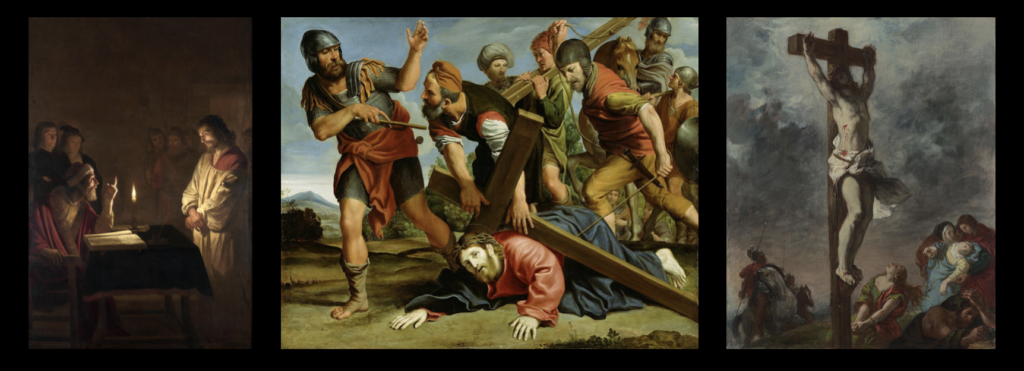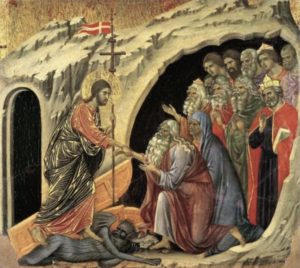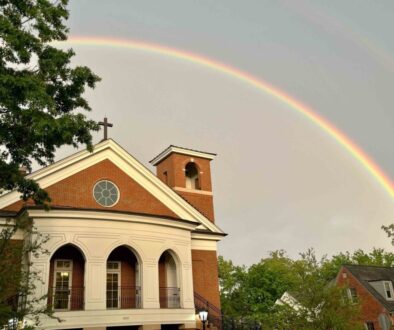Hosanna

Hosanna
[display_podcast]
This is the text of Restoration’s Palm Sunday sermon, preached over Zoom, by The Rev. David Hanke. Hosanna! means ‘save us!’ When the crowds shout Hosanna! They are asking to be saved.
[8] Most of the crowd spread their cloaks on the road, and others cut branches from the trees and spread them on the road. [9] And the crowds that went before him and that followed him were shouting, “Hosanna to the Son of David! Blessed is he who comes in the name of the Lord! Hosanna in the highest!” [10] And when he entered Jerusalem, the whole city was stirred up, saying, “Who is this?” (ESV)
Matthew 21:8–10
Intro and Frame
I want us to start with the shout of Hosanna that greeted Jesus as he arrived in Jerusalem.
With great sincerity, the people wanted to be saved. “Hosanna! Save us!”
As the crowd lives the week to come, salvation is the topic that most frequently comes up. Hosanna will be whispered and shouted and acted out.
Who will save whom? And what will salvation be?
Hosanna is the fundamental cry of humanity: We want to be saved. We want to be released and delivered. We want to be rescued, set free, and led by someone else. The cry of our soul has not changed. But the object of our hosannas is myriad.
Matthew 26:36-27:54
Can I die without dying?
It starts with Jesus, in the garden. Jesus begins with his own hosanna. He’d like to save himself.
After their last supper, Jesus knew the narrative of saving was put irrevocably in motion. Judas had dipped his bread and slipped out the back.
As He prayed, Jesus was clear-eyed in his vision and He could feel the coming loss and abandonment deep in His gut. He asks his Father if he can save himself.
If it be possible, let this cup pass from me.
If it be possible, let this cup pass from me.
If it be possible, let this cup pass from me.
3 times. Jesus was in for the project of salvation. He was open to being the savior. But He was asking- is there a way to save without the physical torture and the crushing abandonment? Can I die without dying?
The question lingers in the damp air of Gethsemane. Jesus strains to hear through the silence. Can the hosanna be for me? Can I save myself? Ultimately he was IN and He drained this hosanna cup to the very bottom.
Almost immediately, Judas comes on the scene, intent to save himself from his decision to follow Jesus. At some point he had said yes to Jesus, just like the other 12. Now he was trying to say no- with a kiss and a ‘change fee’ of 30 silver pieces.
He is able to escape from ‘friend of Jesus’ to ‘betrayer of Jesus’, but he’s never quite able to get away from himself. His hosanna is to throw the money back and to throw his life down.
Not much saved. Much lost.
The disciples try to save themselves.
Their hosannas start with a drawn sword. One of them cuts off the ear of Caiaphas’ servant.
Jesus rebukes that disciple by saying, I don’t need you to save me with your sword. Put it away. If I wanted to be saved, I could ask my Father for 12,000 angels and he would send them. YOU are not going to save ME and definitely not with that.
Their next hosanna occurs as Jesus is led away: the disciples, the whole team, tries to save themselves by leaving Jesus, by running away. They fled. (26:56b)
Peter would give that hosanna words in the courtyard of the high priest. “I do not know what you mean. I do not know the man. I swear- I do not know the man.”
Hosanna by dead sprint, by distance and disassociation.
Caiaphas wants to save his campaign.
Frederick Buechner quote.
Caiaphas’ math was unassailable. Jesus’ math was atrocious.
Caiaphas’ hosanna was to find false witnesses to accuse Jesus. And eventually one of the accusations sticks: ‘This man said, I am able to destroy the temple of God, and to rebuild it in 3 days.’ (Matthew 26:60)
This was outrageous to Caiaphas- Have you no answer to make??
Jesus remained silent. The assumptions they had built about him were given oxygen to grow and death was the judgment. One would die to save many from Rome. Caiaphas got his hosanna, kind of.
Pilate wants to save himself from his troubled conscience and the tossing and turning dreams of his wife by offering Barabbas, by pleading the innocence of Jesus, and by washing his hands. Pilate’s hosanna is to offer the crowd a choice. A choice that seemed so obvious.
Yet, when he offers the crowd a choice of who to save, they choose Barabbas.
It utterly confounds him.
His wife has told him to have nothing to do with this righteous man. He, himself, has found nothing wrong with Jesus.
Instead of courageously disagreeing, Pilate actually turns to the ‘wisdom’ of the crowd and asks in bewilderment: “Then what shall I do with Jesus who is called Christ?” It is the crowd, our voices thrown in for good measure, that decides he should be crucified. “Let him be crucified!”
Hosanna for Barabbas.
It was this crowd that had started all this… with their tree branches and cloaks. Those who shout hosanna will treat him with derision. Hosanna will take the shape of contemptible scorn.
Those who had shouted hosanna will say, “You who would destroy the temple and rebuild it in three days, save yourself! If you are the Son of God, come down from the cross.” Matthew 27: 40
And of course he couldn’t. He wouldn’t. He didn’t.
The crowds walk by within a few feet of Jesus, deriding him, wagging their heads, words dripping with mockery. ‘You talked a big game, Jesus. You were so pompous. If you could destroy the temple and rebuild it in 3 days, can’t you save yourself?’
Come down from the cross. Can’t you hosanna yourself?
No. I can’t save myself and save you. Salvation costs. This is your hosanna, not mine.
My blood. My broken body. My utterly forsaken soul. My completely abandoned loneliness.
This is your hosanna, not mine.
Holy Saturday and the Salvation of Christ
As we walk through this week together, I draw your attention to the space between Jesus’ death on Friday and his resurrection on Sunday. I draw your attention to anticipate Saturday as the culmination of your hosanna. On Sunday, we will give an Easter shout: Alleluia! Christ is risen!
But Saturday is the day for ‘hosanna’ in all its consummation.
My friend, Travis Pickell (WM alum, Falls Church fellow) published an article in CT this month about Holy Saturday called, ‘Before Christ rose, He was dead’. It presents this argument that Saturday is our hosanna. Saturday confirms to us that Jesus was really dead and defeating death.

Maestà – Passion: Descent To Hell, 1308-1311
by Duccio di Buoninsegna
It is on Saturday that Christ was the Victor
A 4th century monk, Rufinus of Aquileia wrote,
“It is as if a king were to proceed to a prison, and to go in and open the doors, undo the fetters, break in pieces the chains, the bars, and the bolts, and bring forth and set at liberty the prisoners.”
In the Maestà altarpiece from the 13th Century, Jesus has broken the bronze doors of Hell, He tramples the devil underfoot. One bishop has written: that [Saturday reminds us] ‘Christ descended into hell not as the devil’s victim but as Conqueror.’
Hosanna! Christ the Victor! Death, Hell, the Devil defeated!
It is on Saturday that Christ was the Sufferer
Gregory of Nazianzus, writing in the 4th century, said, ‘What has not been assumed by Christ has not been healed.’ CS Lewis picked up this idea in the mid-20th century when he wrote, ‘Nothing in you that has not died will ever be raised from the dead.’
Jesus must experience everything. All of our humanity. Our spiritual healing requires that Christ suffer not just biological death but also the agony of death: When Jesus cried out, ‘My God My God why have you forsaken me?’ it led him to Saturday: the terrible abyss of feeling forsaken and estranged from God.
Every aspect of being human (including death) has been assumed by Christ.
Hosanna! Christ the Sufferer.
It is on Saturday that God was most absent and most present.
The logical end of all of us this comes out in 2 Corinthians 5:19 which says that “God was in Christ- reconciling the world to himself”. If indeed God is in Christ, God was in Christ even while Christ lay dead in a tomb.
Hosanna. God experienced what it is to be dead.
Travis writes,
‘This (admittedly inconceivable) thought forces us to think at deeper levels yet, of who God is and how God works… If God was in Christ in the grave, than death cannot be wholly alien to God, and neither can it be wholly alien to the human condition…. Whatever else ‘he descended to the dead’ means, this phrase proclaims that God’s solidarity with the human condition extends at least 6 feet under the earth. Even in the grave, Jesus is still Immanuel, God with us.’
If God is present in Jesus’ death THAN God is present even when he seems most absent (dead).
AND In His absence and death, God is doing his most creative and life-giving work.
Come down from the cross. Can’t you save yourself?
No. I can’t hosanna myself and save you.
Salvation costs. My blood. My broken body. My utterly forsaken soul. My completely abandoned loneliness. My death. My Saturday. This is your hosanna, not mine. Amen.
